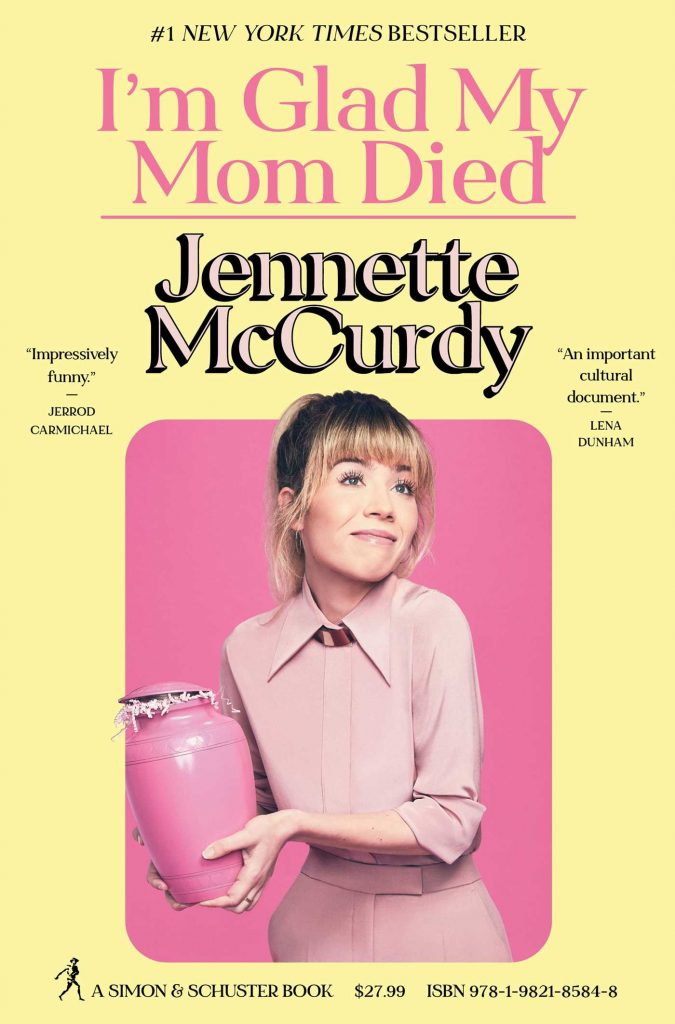
Jennette McCurdy’s titular authorial debut “I’m Glad My Mom Died” has been the center of literary discussion since before its publication early last month. And with a title like that, how could it not? Even the cover sports a smiling McCurdy holding a bubblegum pink urn, overflowing with multicolored confetti. These controversial aspects of her memoir certainly helped catapult her story into the spotlight, but its staying power must be directly credited to the astonishing realism and complexity McCurdy crafts in the words of her novel.
The curse of childhood stardom looms over McCurdy throughout her novel, which takes readers from the start of her — begrudging — acting career to the aftermath of her mother’s death as a result of cancer. The title would lead the reader to assume McCurdy harbors and has harbored an intense hatred for her mother throughout her life. The book, however, reveals a deeply disturbing yet honest description of her admiration of her mother, and the lengths it took to unravel the corrupted mindset that resulted from her mother’s conditional and manipulative love. Starting at the age of six, McCurdy’s mother began molding McCurdy into “mommy’s little actress” by forcibly enrolling her in acting, dancing, singing and accent classes. She made McCurdy learn to pogo stick, jump rope and most notably, cry on command to increase her odds of getting hired for more roles. However, McCurdy explained the turmoil of hating acting while loving her mother and wanting to appease her 24/7.
“She wanted this [acting success],” McCurdy wrote. “And I wanted her to have it. I wanted her to be happy. But now that I have it, I realize that she’s happy and I’m not. Her happiness came at the cost of mine. I feel robbed and exploited.”
McCurdy’s mother would whiten McCurdy’s teeth, tint her eyelashes, and detrimentally enforce the concept of “calorie restriction,” which would hypothetically allow McCurdy to maintain her skinny youth and stop her “boobies” from growing in. She would also give regular genital exams and baths to her children even as they breached older adolescence. The candor and nuance that McCurdy gives her relationship with her mother is the drawing force of the book, described in a way that reveals the hardest parts of the relationship without drawing any punches. However it still infuses a wonderful and refreshing shot of humor that tapers the heaviness in a way that does not detract, but instead allows for understanding. It was surprising to see how clearly McCurdy was able to communicate her relationship and how it affected her in the years to come, and how effectively she was able to step in and out of her childhood mindset at the height of her abuse. And, as we are taken from moments of despair and helplessness in her childhood to moments of growth and healing in her adulthood, McCurdy seamlessly guides the reader through her residual and everlasting symptoms of narcissism, neglect and manipulation. Her symptoms included anorexia, bulimia, low self-esteem, commitment and relationship issues and a refusal to see the negative effect her mom had upon her. We are truly able to see the frightful lows of McCurdy’s continuous road to recovery.
The thing that remains the most poignant in this reading experience is McCurdy’s failure to villainize her mother, despite what the title and cover may insinuate. The amount of grace that McCurdy has throughout the book is really what makes the story so hard-hitting. It is what makes the reality of her difficult past that much more inspiring, as she leaves the memoir on a high note. Although she has separated from acting, McCurdy has a bright future ahead of her with her talent in writing and podcasting.
The reception of her debut has been nearly unanimously positive, selling out in many stores just hours after its release and receiving rave reviews from audiences and critics alike. It is a book that is widely recommended, but not just because of its brilliant prose and unique premise — although those aspects certainly do heighten the experience. No, instead, the book’s discussion of the treatment of young people in the entertainment industry is incredibly pertinent as the rise of child influencers, family vloggers and accessible fame enter societal consciousness. What McCurdy went through, not only with her mother but also with fame and The Creator — aka the haunting nickname given to the creator of “iCarly” — is emblematic of many other manipulative relationships that plague the entertainment industry today. This is why it is so important for McCurdy to exemplify not only the issues that stem from that particular relationship with someone — whether it be a mother or a manager — but to also spread awareness of the dangers of throwing young children into the shark tank that is the entertainment industry without the proper support system or precautions.
“I’m Glad My Mom Died” is a five-star read that leaves you contemplating the ethics of childhood stardom in a way never before examined, and is available anywhere books are sold. Additionally, the audiobook is available on Audible, read by McCurdy herself.


